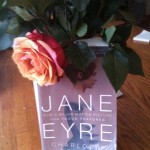The Bible and Beyond: Reading Religiously
He no doubt meant it as a compliment, but when Rick Santorum referred to his wife Karen as “the rock which I stand upon” (The New York Times, 2/4/2012), apparently crediting her for the solidity of his religious faith, I was glad that my husband would know better than to describe our relationship this way. Besides the obvious fact that it would be uncomfortable to be stood upon at all, and that the rock involved wouldn’t have any freedom of movement, I have not functioned as a spiritual foundation to someone who is, after all, an Episcopal priest.
This is not to say, of course, that I don’t support and accompany my husband in all kinds of ways – just that I was not responsible for the decision he made to embrace his faith as fully as he has. Our discussions before marriage were different than the ones the Santorums apparently had; I wanted details about his past (which included going to church), and he had to hear about mine (with the going to church part missing). We needed to figure out where our meeting ground would be, because it was clear to both of us that we were in love and wanted to be together.
We soon discovered that great literature would provide an expansive field; we had each been English majors and had – between us – read lots of novels, plays, essays and poetry. How great it would be for us to be able to talk about these works in a post-college kind of way — free of the academic constraints of having to turn something in the next day. It didn’t take long for us to discover though, that there was, alas, a kind of un-evenness on this front: when I ventured to ask some questions (which I thought were pretty intelligent) about famous figures or stories from the Christian tradition, Rob would often heave a sigh and say to me, “Polly, would you please just read the Bible!” There I was, exposed. Although I had in fact read parts of the Bible, had taken even a whole course once, I wasn’t really anywhere near the theatre where my husband was securely seated, watching the myriad characters that he knew so well act their parts over and over again. Sometimes, frustrated, I would vow that I would set myself the goal of going right through the Bible cover to cover – try valiantly to make up for lost time. This hasn’t quite happened; in recent years, I have become more at ease imbibing the readings each Sunday at church, relaxing a bit about the whole thing, letting the words wash over and through me however they do.
During this primary season, when some candidates try to out-do one another in their religious garb, I have found it particularly refreshing to spend some time re-reading a few novels that are not really about religion but do present different “takes” on people and their religious alignments: some characters profess to be devout in a hollow kind of way, others may or may not identify themselves as religious but are in fact quietly living out a strong set of values, and still others are groping for understanding of who/what a higher power might actually look like amidst almost unbearable suffering.
Of course a whole lot of books could portray these various types of characters; the three particular ones that I have been re-visiting are Jane Eyre by Charlotte Bronte, David Copperfield by Charles Dickens (these two written only a few years apart in the mid-19th century) and a book published 30 years ago that was like no other before it: The Color Purple by Alice Walker. I have my daughter’s English class to thank for bringing me back to the amazing first person narrators of Jane and Celie, women in completely different circumstances and yet sharing a will to survive; I am just now starting to re-read David Copperfield (the first big novel I ever really loved) because my local library is starting a reading group in honor of the 200th anniversary of Dickens’s birth.
Dickens had mixed views of organized religion; he held up cherished Christian values wherever he saw them, but often he found them blatantly missing in the institutional “Church” and shining much brighter in individuals who led humble lives. He didn’t have any use for those who liked to draw attention to their good works or, as my mother — who inherited her love of Dickens from her mother – would say, people who acted “holier than thou.” In the early chapters of David Copperfield, for example, we meet the wonderful Mr. Peggotty, a very jolly man who lives in cramped yet charming boat where he has taken in a niece, a nephew and a widow of a former fellow fisherman – just because they needed homes. He is the very image of Christian compassion and humility, and he doesn’t profess to be a church-going man.
Towards the end of Jane Eyre, after Jane has had to leave Mr. Rochester and before she goes back to him, she has to contend with the strange character of St. John and his determination for her to join him on a Christian mission to India. He goes on and on about why she simply must become his wife in order for them to fulfill God’s purpose, all for the greater cause, but he sounds not only ridiculous but also completely boring and joyless. She is smart enough to know that she needs to find real love in someone who actually makes her heart pound.
In the first part of The Color Purple, Celie, a fourteen year old girl, writes letter after letter to God, conveying the facts of the abuse she suffers from her cruel father and then her husband. There is no relief in sight, no explanation for the suffering, but she hangs on, and finally she learns from Shug Avery that maybe God doesn’t have to be some stern old white guy in the sky but can instead be “that feeling of being part of everything” and also a being, or maybe even an “it,” that wants us to seek and find pleasure for ourselves in natural things and everyday experiences.
Let the candidates boast about how deeply religious they are and how their wives provide their foundations..…. I plan to keep on reading my books– un-rock-like –side by side with my husband and his books. He may know the Bible cold, but he might as easily be seen reading Patti Smith’s Just Kids as St. Augustine’s Confessions. From what I understand, there’s religion to be found in both.



Great!
I hope that you keep on writing your blogs, Polly, as I find your writing inspiring, very entertaining, and quite educational.